Lee McKillop, better known as Lee Mack the comedian and actor, was born in Southport into a working class family. He was already aware that making people laugh ran in his family before he began the Who Do You Think You Are? journey:
When I started doing comedy my grandmother said ‘Oooo, like your great grandad Billy Mac’
At the start of this investigation Lee doesn’t know very much at all about his great-grandad Billy Mac and he wants to find out much more about this comedian in the family. Lee has some autographed photos and mementos in his possession and in his episode of the genealogy programme he discusses what he has with his wife Tara:
Lee: “Jobbing!? He’s my great grandfather!”
Tara: ‘Well he’s obviously a jobbing comic, isn’t he? He’s just getting out there and…’
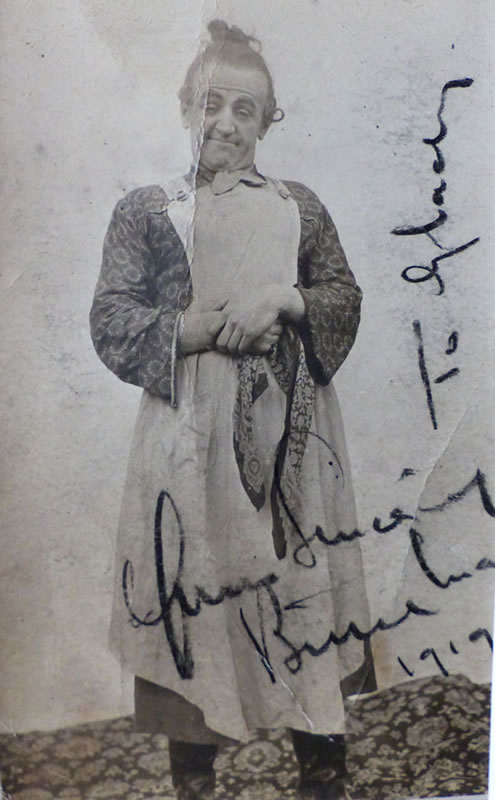
The photographs show Billy Mac in costume. There is one in which he is dressed as a dapper man and in another as a panto dame. One of the images has been addressed to a mysterious women by the name of ‘Gladys’. This has Lee wondering whether this person could have possibly been his great-grandmother. A newspaper cutting that he has reveals that Billy Mac had performed at the ‘Chic Casino’ in Southport though it doesn’t disclose that much more information about the comic’s life or career. By using the index of General Register Office (GRO) birth records Lee is able to get the details needed to order his great-grandfather’s birth certificate. When it arrives from the GRO it shows that Billy Mac had been born as William Alexander McKillop.
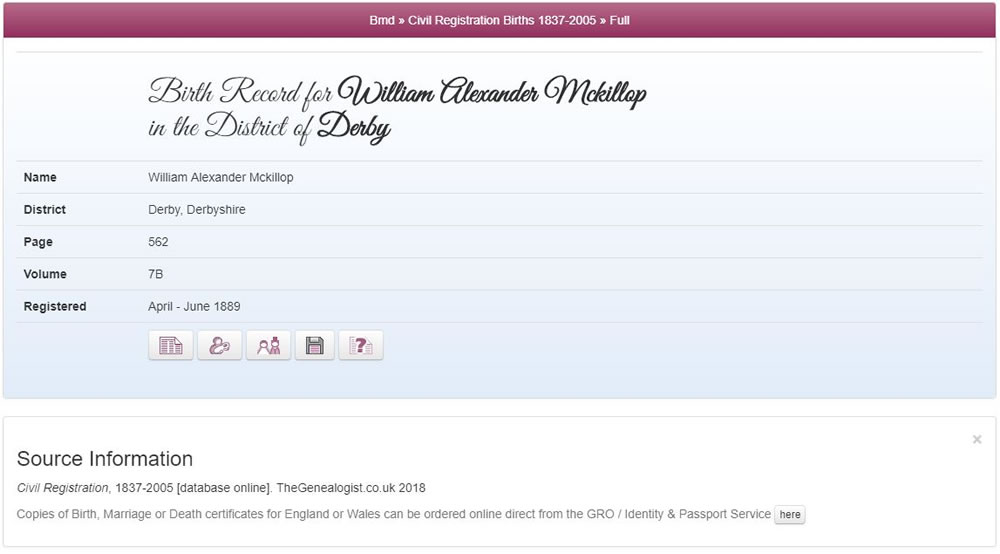
Having discovered Billy’s full name, this allows Lee to look online for more records and he is able to then find his great grandfather’s medal roll. This gives him the information that Billy Mac had served in the Liverpool Regiment, or more correctly the King’s Regiment (Liverpool).
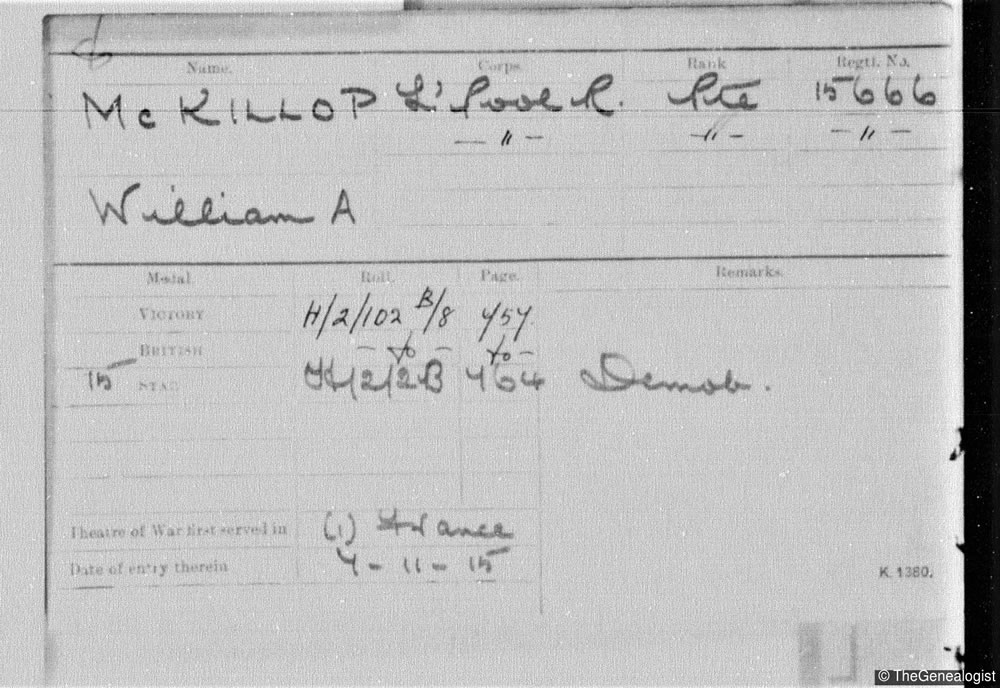
Lee then heads to Liverpool on the trail and here he learns that Billy Mac volunteered in August 1914 as part of the ‘Liverpool Pals Battalion’ and was one of the first group of 1000 to volunteer. In World War One the concept of a Pals battalion was that men were more likely to sign up if they could serve with their friends, colleagues and neighbours all of whom would have been similar in terms of their background.
The new recruits to the Liverpool Pals were sent to Lord Derby’s Estate at Knowsley Hall after they had signed up. Lee travels there in the programme and learns from a local newspaper that had been published at the time about an entertainment performance that Billy Mac had been involved in. It was apparent that this show had taken place after Billy had joined the army and not before. Lee read aloud:
‘Billy Bray’s boys continued the amusement of the troops til after 9 o’clock. The artists included Billy Mac, comedian’. Hello?! Oh that’s brilliant, that’s a great start!
Lee then realises that the date of the show would have been just a few months before Billy Mac would be due to leave for France to join the fight against the enemy. Wanting to follow in his great grandfather’s footsteps, Lee traveled to Northern France.
As a professional comedian you do look out for the laughs. So going to northern France to talk about the First World War, it doesn’t scream source material for jokes, does it?
Lee finds out on his visit to the country that Billy had been heavily involved in the action that took place on the first day of the Battle of the Somme. This hideously brutal day saw the British try to break the German line on the western front when the allies launched their week-long bombardment followed by an infantry attack where almost 20,000 British soldiers were killed in one day.
![December 23rd 1916 The Great War Newspaper [Issue 123 page 18]](/images/featured-articles/2018/who-do-you-think-you-are/00871/wdytya2018-mack4.jpg)
Lee is able to discover where his great-grandfather was in the conflict. Billy Mac was part of the third wave of the infantry attack that had to negotiate barbed wire and enemy artillery fire as they crossed no-man’s land.
It’s so counterintuitive. If you see a man fall to the ground because he’s been shot, the last thing you think is, oh I’ll run in that direction.
But Billy’s war was not just about the horrors of fighting as an account written at the time by his Commander, FC Stanley, revealed. Billy Mac was a member of a comedy troupe that performed for their comrades in the summer of 1916 and going under the name of The Optimists.
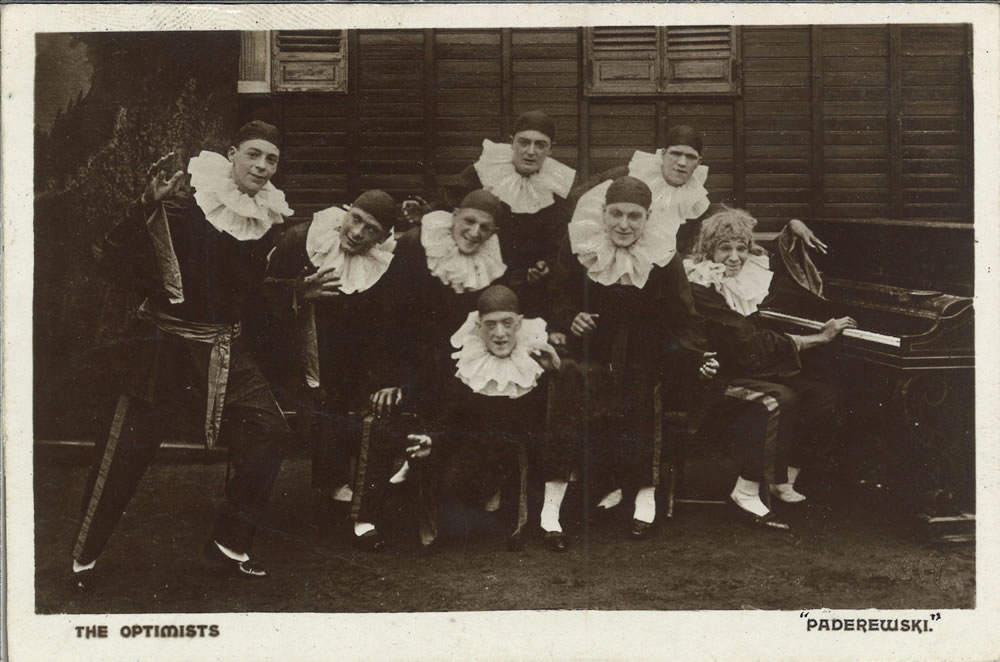
Moving on to Ypres in Belgium, Lee finds out that The Optimists performed straight after fighting the enemy in battle. They didn’t even have time to change out of their uniforms into costumes, putting on a show as they were. Some of their performances had been performed in full view of the trenches on the front line and regularly used disturbingly gruesome material as subject matter for their show.
That’s unbelievable to be actually shot at, or perhaps to kill someone, and then to walk on stage.
In the TV programme Lee is able to look at two postcards that depict The Optimists and he is thrilled to identify his great-grandfather Billy Mac. Turning the card over reveals a handwritten glowing review of the comedy troupe:
‘One of the many concert parties travelling about near the front line. They are the best I have seen so far.’
Not being able to find any records of The Optimists’ performances after 1918, Lee then returns home to Southport. He knows, from his own collection of memorabilia, that Billy Mac had been performing in Southport once the war was over. Meeting up with a historian and performer who is able to paint a picture of the types of characters that Billy played, Lee hears that his great-grandfather took on roles of a “swell” and a “dame” and he hears a rendition of a song that his ancestor was known to have performed. ‘Cabbages, Ca-beans and Carrots’.
Access Over a Billion Records
Try a four-month Diamond subscription and we’ll apply a lifetime discount making it just £44.95 (standard price £64.95). You’ll gain access to all of our exclusive record collections and unique search tools (Along with Censuses, BMDs, Wills and more), providing you with the best resources online to discover your family history story.
We’ll also give you a free 12-month subscription to Discover Your Ancestors online magazine (worth £24.99), so you can read more great Family History research articles like this!
My kids are just learning piano so maybe I could…sing along… and my kids will give me that look of ‘please can we have a playstation?’
By ordering Billy Mac’s marriage certificate Lee is able to find out that his great-grandmother’s name was Gladys this had been the name he had seen on the autographed photo in his own collection.
You don’t think of autographs staying in the family; they go away to other people. But that’s why it stayed in the family. Wow, isn’t that brilliant. He’s ended up marrying an autograph hunter!
Lee discovers that Billy Mac’s comedy career was short-lived. In 1922 he was listed as a manufacturer of wireless apparatus and by his death in 1959 he’s become a sales representative.
So his comedy career was weirdly not as big as I thought it was, and yet at the same time more important than I thought it was… he didn’t go for decades in the variety halls of Great Britain but…it sounds like he did a really worthwhile job with it. This boosting of morale during the war; sounds like it can’t be underestimated.
Lee turns his attention to his mum’s side of the family and pops down the road to visit his Auntie Frances.
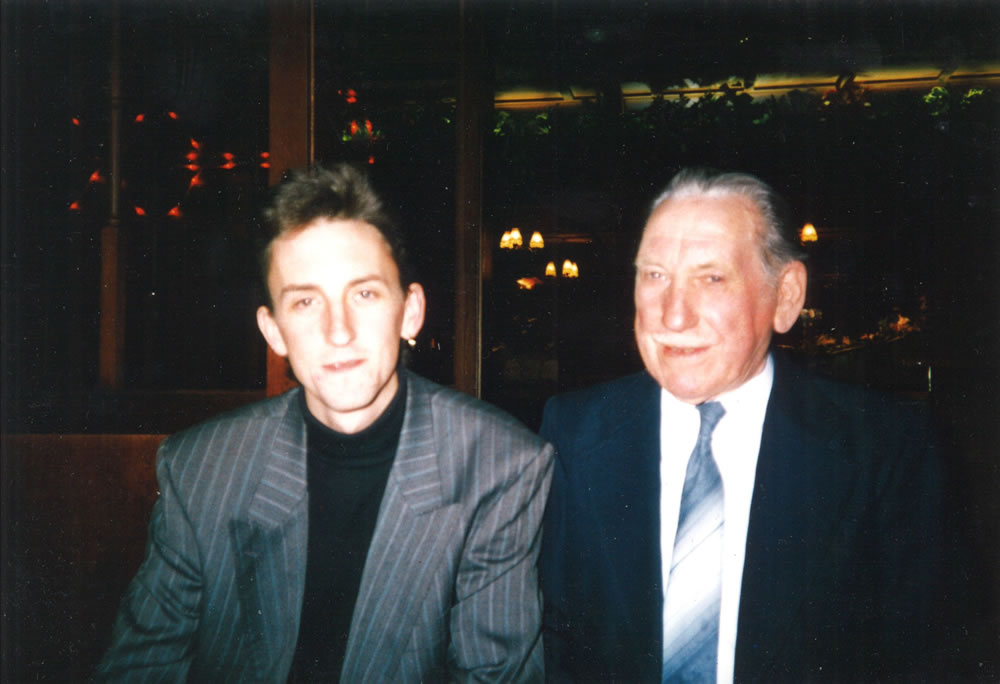
Lee has fond memories of his grandad Joe, whose upbringing was always a bit of a mystery. Joe’s mother’s name was Delia and Joe was her illegitimate child. Delia left him with his grandparents and went off to Canada, but no one knows why. Joe’s grandparents (Lee’s great-great grandparents) were Thomas and Mary Farrell and they came from a smallish town in southern Ireland called Ballina Lee’s next destination.
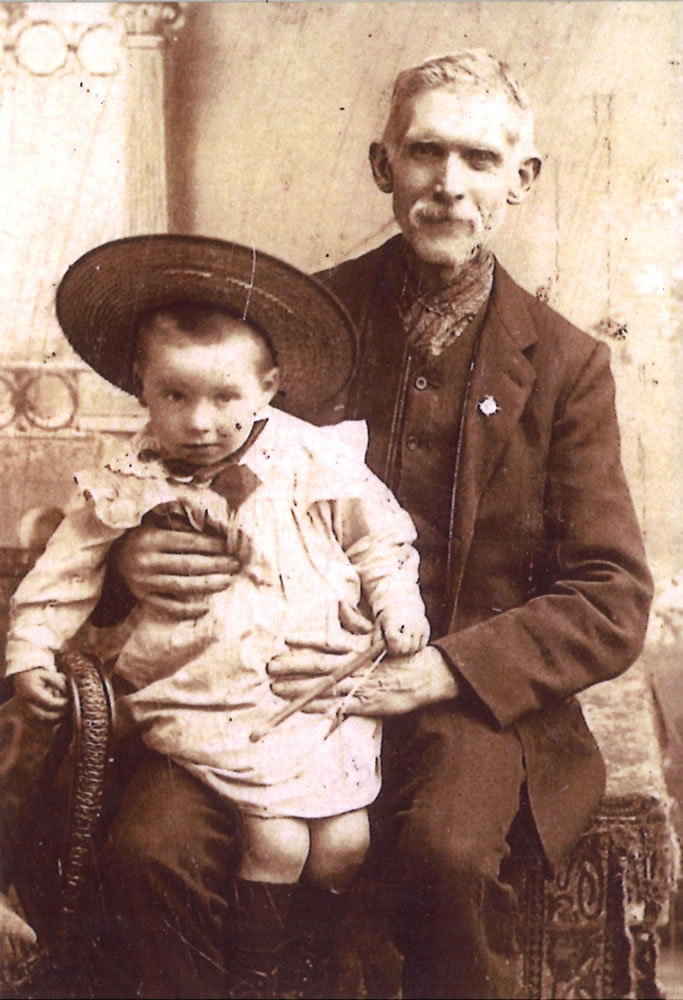
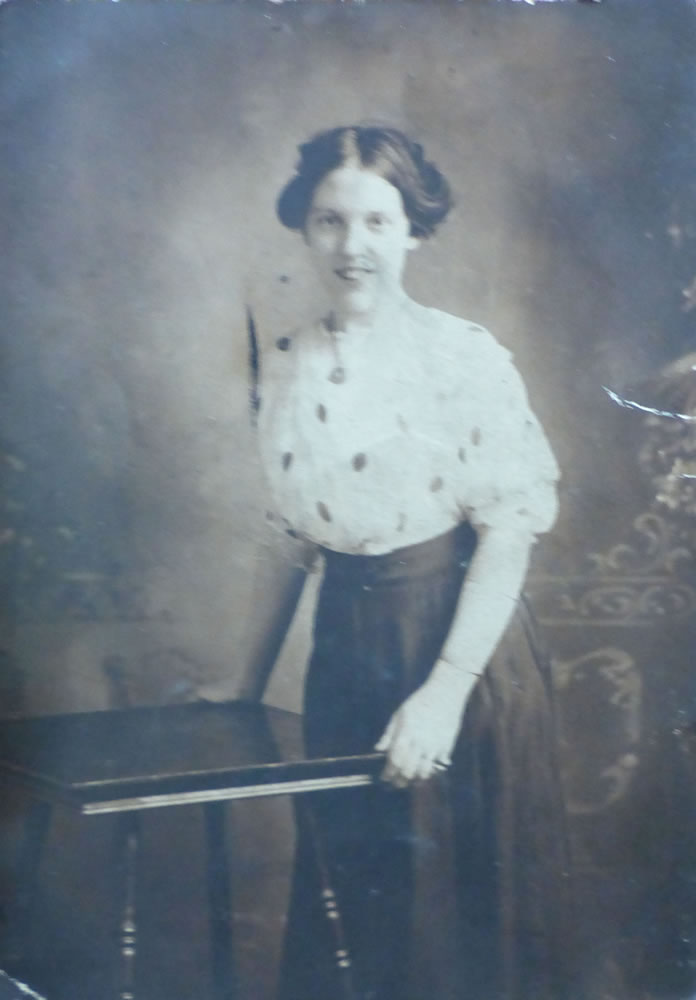
Lee finds it difficult to understand why his great grandmother would leave her small child in Ballina to go off to Canada. He wants to find out more about her situation and visits Ballina Archive. Lee is surprised to discover that his grandfather is listed in the 1911 Census as Matthew Felix Kingsley, so his name must have been changed later to fit into his grandparents’ family.
A Passenger List reveals that Delia left for Montreal in September 1911, when Lee’s grandfather was just over a year old. Her passage was paid for by an agency that recruited domestic servants and paid for their travel to Canada. Lee learns that there was a huge stigma around having a child out of wedlock at this time and Delia would have struggled to find work in Ireland. Although Lee can’t know for sure whether Delia chose to go or whether her parents asked her to, it must have been heartbreaking for her to leave her son.
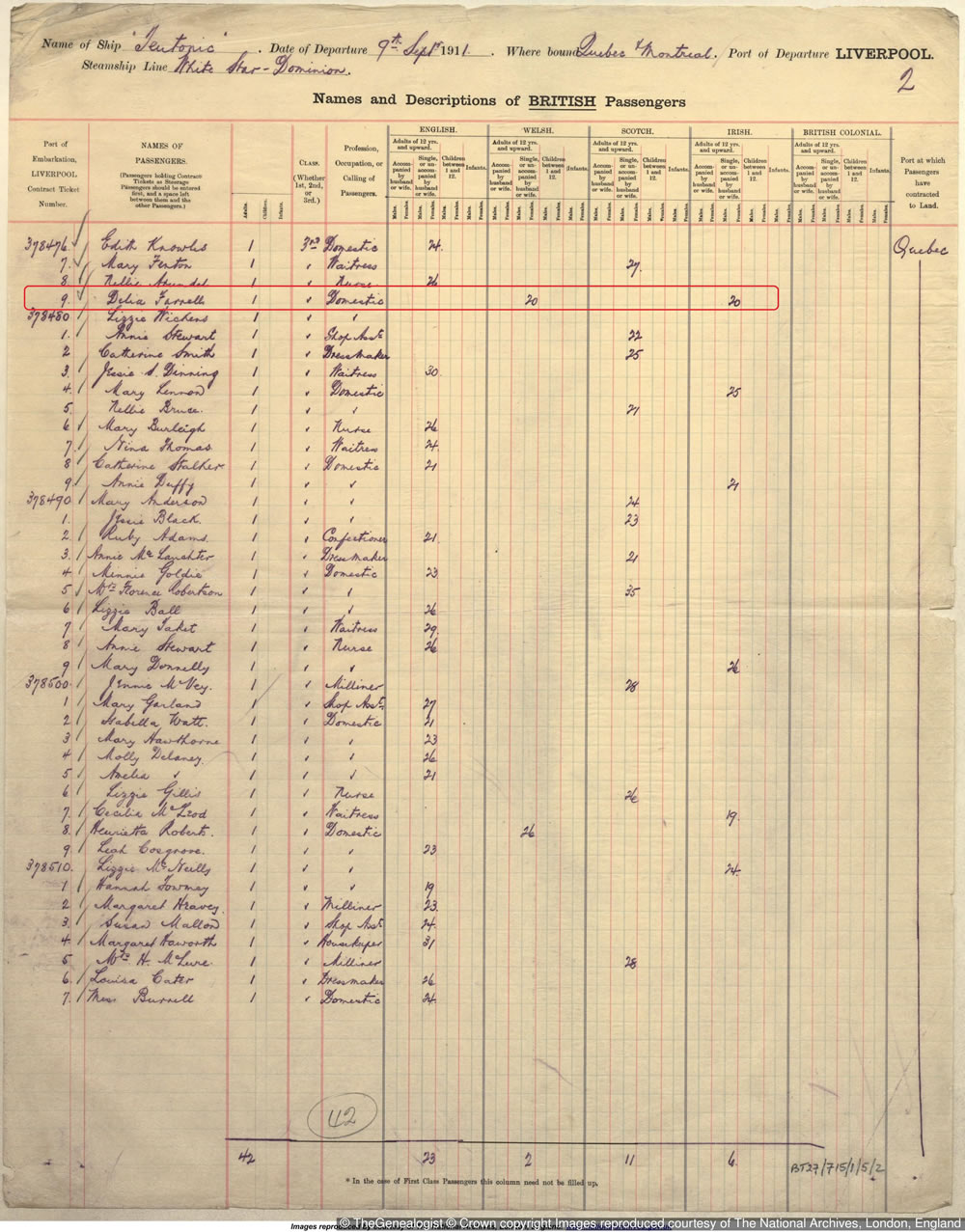
I think I have more sympathy for Delia now I know a bit more about perhaps what led to it; what else could she do?… perhaps it was more socially accepted and normal to hand your child over to the grandparents than be a single mum which was totally unacceptable.
To find out more about his grandad Joe’s upbringing with his grandfather, Thomas Farrell and grandmother Mary, Lee heads to the street where the Farrells lived. He meets a historian here and discovers that the Farrell family lived in only two rooms and that, with eight people to feed, it was a hand-to-mouth existence.
Inside the pub which now stands on the site of the Farrell family home, Lee learns more about his great-great-grandfather. Petty Sessions records from 1915 reveal that Thomas Farrell was selling unlicensed alcohol and running an underground pub a “shebeen.”
So this house that is already packed to the rafters with children is also a pub? An illegal pub?
Thomas Farrell is ordered to pay a hefty fine for his illegal activities, but this doesn’t seem to deter him and Lee discovers that fines for the same activity go all the way back to 1892!
The historian then shows Lee a different sort of document: an insurance claim, which describes how the doors and windows of the Farrell’s home “were wantonly and maliciously damaged or injured by rifle fire.” This happened in September 1922 right in the middle of the Irish Civil War.
The Irish Civil War was triggered by a treaty drawn up between the British and Irish Republicans after the War of Independence. This treaty established a new Free State of southern Ireland but one which would remain a Dominion of the British Empire bound by an oath of allegiance to the crown. Many Republicans saw this as a betrayal of what they’d been fighting for. So Republicans split into two camps pro and anti treaty and turned on each other in a bitter year-long civil war that saw towns and families divided.
Whether Lee’s great-great grandfather Thomas Farrell had allegiances to one side or the other, or the home was simply caught in the crossfire, Lee’s grandfather Joe was almost certainly in the house at the time. A twelve-year old in 1922, he grew up during a time of huge upheaval in Ireland. Lee is struck by how tough his grandad Joe’s upbringing was. Lee recalls that his Grandad Joe was a worrier, so learning about his childhood makes some sense of his character.
It’s been really interesting finding out about these things that have been always hovering on the edges of my life. These ancestors can be sort of abstract people. So once you start tapping into it just a little bit, you do get more wrapped up in it and they become real people.
Sources:
Press Information from IJPR on behalf of the programme makers, Wall to Wall Media
Extra research and record images from TheGenealogist.co.uk
Photos from BBC Images






